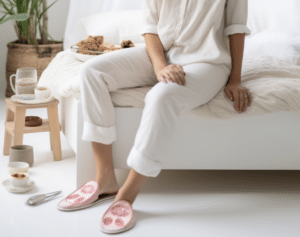Introduction – Fair Trade Slippers
As the wheels of fast fashion continue to spin, a push for sustainability and ethical production is gaining momentum in the fashion world. By choosing ethical slippers, you’re not merely making a purchase, but casting a vote for responsible and conscientious consumption.

This practical guide will lead you down this path by helping you understand what makes ethical slippers worth investing in and how to select the perfect pair.
What Makes Slippers Ethical
Ethical slippers symbolize care and respect for our environment and people. These products adhere to fair trade principles, using eco-friendly materials and promoting humane working conditions and equitable wage and labor exchange. When you opt for these slippers, you’re backing brands that prioritize both social and environmental wellbeing.
Ethical Vs Traditional Slippers
While traditional slippers may tempt you with comfort, the hidden impacts of their production can be devastating, often involving cheap labor and non-environment-friendly materials.
Ethical slippers tell a different story – one of minimal environmental impact, worthwhile wages, and improved working conditions. With ethical slippers, you’re paying for a pair of warm, comfortable footwear, and a cleaner, sustainable world.
Carbon Reduction and Sustainability in Fair Trade Slippers Production
Your slippers can be green too. Ethical slipper brands choose organic or recycled materials and lean towards cleaner manufacturing processes, considerably reducing their carbon footprint.
This conscious choice for renewable resources and energy-efficient techniques leads to a decreased environmental impact.
Features of Ethical Slippers And Fair Trade Slippers
Ethical slippers marry comfort with sustainability. Crafted from sustainable matter like recycled polyester or organic cotton, these slippers combine style, durability, and responsibility. They offer a low waste and long-lasting solution to slippery floors and cold toes.
Brands Championing Ethical Slippers
TOMS
TOMS has made its mark in the social responsibility scene with its one-for-one giving model. Each pair of their comfortable, stylish slippers extend a warm handshake to sustainability through the use of responsibly sourced materials.
With prices ranging between $50-80, TOMS offers affordable luxury that doesn’t cost the Earth. The brand has received multiple awards and accolades for its initiatives towards greater social impact.
The company also proudly states, “We are a proud member of the Fair Labor Association (FLA), and we remain committed to purpose, planet, people, and taking it one step further by making sure our products and processes reflect our commitment to bettering worker’s rights in our manufacturing and production.”
Being an FLA member means that Tom’s is held to rigorous standards that ensure fair labor practices, safe working conditions, and transparent operations. You can cozy up in your slippers knowing that the person who made them is being treated fairly and responsibly.
Patagonia
Patagonia’s reputation for sustainability is well-deserved. Their Worn Wear Slippers, created from recycled materials, not only feel good on your feet but sit well with your conscience. Customers often testify to their durability and comfort, with one online buyer stating, “They’re incredibly comfortable, sustainably made, and they’ve lasted for years!”
Patagonia’s commitment to fair trade is longstanding, having partnered with Fair Trade USA since 2014. Notably, Patagonia offers more styles made in Fair Trade Certified™ factories than any other apparel brand, a feat that has positively impacted over 75,000 workers globally.
This is not merely a symbolic gesture; Patagonia pays a premium for every item produced in these certified factories. This additional funding goes directly to the workers, who democratically decide how to allocate these funds for community projects, personal necessities, or even as cash bonuses.
Oliberté
Oliberté is a standout in the ethical footwear industry. As the first Fair Trade Certified footwear factory, their quality and sustainable practices are unmatched. Their slippers, created with responsibly sourced leather, are celebrated for being incredibly comfortable and durable.
Oliberté sets a trailblazing example in ethical footwear manufacturing, right from its base in Addis Ababa, Ethiopia.
The company holds the distinction of operating the world’s first Fair Trade Certified™ footwear manufacturing factory, a milestone achieved after passing a rigorous set of over 255 compliance factors and enduring an intensive audit by Fair Trade USA.
This certification isn’t just a label; it is a tangible commitment to empowerment, economic development, social responsibility, and environmental stewardship.
Oliberté ensures that its workers are paid well—over double the minimum wage in Ethiopia—while also offering a community development premium.
The democratic ethos extends to the factory floor, where a workers’ committee transparently decides how Fair Trade premiums are spent, whether on community needs or as cash bonuses.
In an industry often mired in ethical ambiguity, Oliberté is a shining beacon, demonstrating that it is not only possible but also profitable to produce high-quality footwear while elevating community and environmental values.
How to Choose Your Ethical Slippers
When investing in ethical slippers, it’s crucial to dig a bit deeper than the brand’s own marketing messages to truly ensure your purchase aligns with your values.
Start by looking for third-party certifications like Fair Trade, Global Organic Textile Standard (GOTS), or B Corp, which provide an independent validation of the brand’s ethical and sustainability claims.
For instance, Fair Trade certification, like that held by Oliberté’s factory in Addis Ababa, Ethiopia, means the brand has passed rigorous compliance checks to ensure fair labor practices, social responsibility, and environmental stewardship.
It might also indicate that workers receive a living wage and have the power to collectively decide how additional earnings or premiums are spent. GOTS certification assures that organic textiles are used and that all environmental and social criteria are met, encompassing every step of production.
B Corp certification is even broader, evaluating a company’s overall positive impact on its workers, customers, community, and environment. Each of these certifications involves a thorough on-site audit and ongoing oversight to ensure brands keep up with their initial commitments.

Hence, certifications offer an extra layer of assurance that your purchase is a step toward a more equitable and sustainable world.
The Impact of Your Purchase
By buying ethical slippers, you’re endorsing fair wages, eco-friendly practices, and a more sustainable fashion industry. Your decision can trigger considerable changes in the industry, promoting ethical practices across various brands.
Conclusion – Fair Trade Slippers
Opting for ethical slippers is much more than a trend. It’s about adopting a lifestyle that minimizes harm to the environment and fosters fair trade.
Your choices today can influence the future of fashion, pushing for a more sustainable and ethically mindful era. Let’s continue to propel this noble cause forward because each small step we take in our cozy ethical slippers is a massive leap towards a better world
